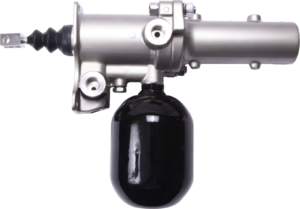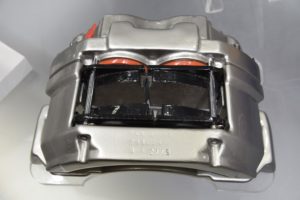Brakes India, part of the TVS Group, unveiled its LCV hydraulic-assisted disc brake system on the first day of the show. The new braking system not only improves braking stability and life which is critical in buses, but also lowers the weight of the braking system significantly which provides ROI to the end customer in a matter of months for load-carrying vehicles. The launch reinforces Brakes India’s commitment to leverage its technology leadership in commercial vehicle braking, to bring benefits to our end customers.

“Light commercial vehicles in India with over 7-ton GVW typically adopt pneumatic brake systems to provide adequate braking. We have found an opportunity to provide a more cost effective and lighter option without compromising on the performance. Brakes India with its advanced engineering capability has developed an actuation system called the Unibooster to extend hydraulic brakes up to 10 tons. This coupled with hydraulic disc brakes and hydraulic ABS provides the end user with a highly optimized solution on safety, stability and performance, while also reducing the overall vehicle weight significantly”, says Mr. Badri Vijayaraghavan, Executive Director – Business Development, Brakes India.
“We have our most exciting product launch in the Unibooster combined with four calipers. This new product provides better stability and improved performance of the vehicle. Compared to a traditional pneumatic system, our product is around 120 kg lighter which gives an ROI in a matter of months for the end customer. We have one OEM customer who has already signed up, with the SOP in the next five months. We also have another customer for whom prototypes are running and if approved, the second SOP should happen latest by early next year”, said Mr. Sriram Viji, Deputy Managing Director, Brakes India.

 The Unibooster and hydraulic disc brake system provides a very progressive car-like brake feel and consistent brake performance under various duty cycles. While the hydraulic system provides a very cost-effective solution, the lower number of components allows for reduced weight and the disc brake provides greater stability even at high speeds and low or no fade coupled with a higher pad life. The fine tuning of this system also lends itself to lower stopping distances providing enhanced safety.
The Unibooster and hydraulic disc brake system provides a very progressive car-like brake feel and consistent brake performance under various duty cycles. While the hydraulic system provides a very cost-effective solution, the lower number of components allows for reduced weight and the disc brake provides greater stability even at high speeds and low or no fade coupled with a higher pad life. The fine tuning of this system also lends itself to lower stopping distances providing enhanced safety.